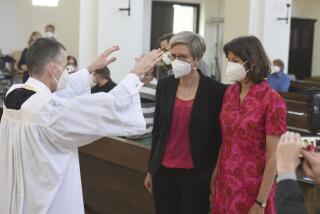COLUMN LEFT : Bible Doesn’t Say What We Thought It Did : New Biblical discoveries move toward acceptance of gays. The law should do the same.
- Share via
Large numbers of Christians believe that God condemns gay people and use the Bible to justify continued civil discrimination. But a new Protestant version of the Bible is more tolerant of and sensitive toward homosexuality, removing one more obstacle to full societal acceptance of gays, including legal marriage and its associated benefits.
The New Revised Standard Version replaces the 1952 Revised Standard, which replaced the 1611 King James Version among mainline Protestants. It attempts to be more literal and less judgmental; for example, in the King James Bible, the Apostle Paul’s epistle I Corinthians 6:9, in listing those to be excluded from the kingdom of heaven, named the “effeminate” and “abusers of themselves with mankind.” The Revised Standard said “sexual perverts,” while the new Bible uses “male prostitutes, sodomites” which is an improvement, although still slightly off if one looks closely at the original Greek.
John Boswell, chairman of Yale University’s History Department, after more than a decade of research into the legal, literary, theological, artistic and scientific records of Greek writers contemporary with Paul, concluded that there is no reason to believe that the two Greek words of the original text, arsenokoitai and malakoi , connoted homosexuality. According to Boswell, malakoi means sexually loose and therefore is not a technical term for homosexual; arsenokoitai means a male prostitute who serves both heterosexual and homosexual clients. Paul is proscribing promiscuity and prostitution, not homosexuality.
Of course, that is not the only Bible verse associated with homosexuality. But Boswell’s study of the Old and New Testaments, including texts in Hebrew, Greek, Syriac and Aramaic, argues that intolerance of same-sex relationships was not an essential feature of early Christianity, but became so only after nearly 1,200 years of church history (“Christianity, Social Tolerance and Homosexuality,” University of Chicago Press).
Others who have come to similar conclusions include former Jesuit priest-turned-psychologist John J. McNeil (“The Church and the Homosexual,” Beacon Press), Robin Scruggs of Union Theological Seminary in New York (“The New Testament and Homosexuality,” Fortress Press), and Maury Johnston, a fundamentalist scholar (“Gays Under Grace,” Winston-Derek Publishers).
The word sodomy from the Biblical city of Sodom is popularly thought to be synonymous with homosexuality, but since the 1955 publication of Derrick Sherwin Bailey’s “Homosexuality and the Western Christian Tradition” (Longmans, London), scholars agree that Sodom was destroyed for inhospitable treatment of visitors sent from God and not for anything to do with homosexuality. Indeed, the word homosexual nowhere appears in the Bible. Sodomy today has a variety of meanings and most states have voided laws against it.
But it is still a long way from legality to societal inclusion, and this distinction should matter to all of us. The AIDS plague and its staggering economic cost have so drastically affected our society that legal recognition of gay marriage should be explored. The virus thought to cause the fatal disease hit gay males disproportionately in part because society does not support and promote stable couples among them. The enormous psychological, social, religious and legal contempt heaped on gays discouraged them from settling down with one partner. As the sexual and social revolutions of the 1960s and ‘70s encouraged gays to seek their own civil and human rights, many embraced promiscuity as a rebellious act without knowing about AIDS.
Just as past plagues altered society, gay people now realize that sexual fidelity in a committed relationship can be a matter of life and death. Public policy, it follows logically, should support gay couples. Constitutionally, gays should have the same rights to privacy, personal liberty and societal stability as non-gays. This would benefit all.
Boswell’s next book is expected to reveal long-suppressed church documents sanctifying same-sex marriages, further eroding society’s preconceptions about the church’s past relationship with its gay members. Boswell’s findings are important issues for public debate and dialogue. As increased knowledge continues to challenge settled opinion regarding gay people, the appropriate legislative committees should seriously explore the issue of same-sex marriage in the context of public-health concerns and societal stability.
More to Read
Sign up for Essential California
The most important California stories and recommendations in your inbox every morning.
You may occasionally receive promotional content from the Los Angeles Times.













